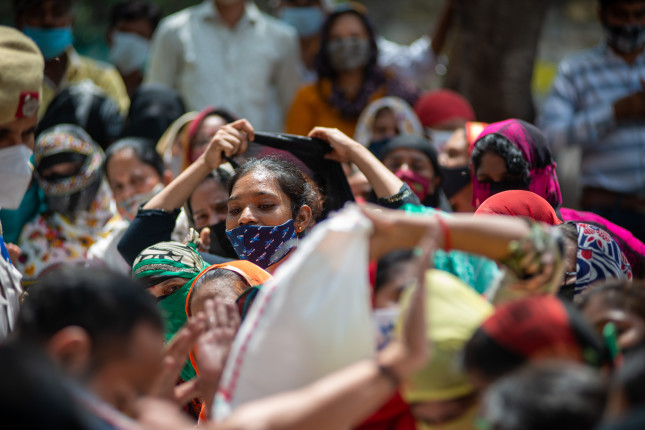-
Covid-19 // Dot-Mom // Reading Radar
Sex Workers Face Heightened Risks during the COVID-19 Pandemic
February 23, 2022 By Deekshita Ramanarayanan
“The COVID-19 pandemic has amplified pre-existing inequalities and vulnerabilities,” writes the United Nations Population Fund (UNFPA) in a recent report on the impact of COVID-19 on sex workers in East and Southern Africa. The pandemic has had an impact on people in marginalized communities around the world, but for sex workers globally, “the impact on livelihoods, human rights and health has been devastating, leaving many struggling to survive,” states the report.
Even before the onset of the COVID-19 pandemic, sex workers experienced discrimination, including stigma, high levels of violence, and criminalization of sex work. Sex workers often carry other marginalized identities, such as being a women, a member of the LGBTQI+ community, displaced, or homeless, which adds to the stigma they face. Researchers from UNFPA conducted key informant interviews with sex worker-associated organizations and disseminated an online survey to assess the impact of COVID-19 on sex workers.
In order to contain the spread of the COVID-19 virus, many governments instituted lockdowns and curfews to provide greater safety and security. However, they also expanded the power of police and other security forces, often resulting in increased violence against sex workers. The lockdowns resulted in a dramatic loss of income for many sex workers, who as a result, had to defy these restrictions to avoid economic hardship. As a result, sex workers faced a greater risk of both COVID-19 infection and arrest for violating curfews and lockdown orders. In fact, the report found that 49 percent of respondents experienced an increase in police violence, and 36 percent experienced an increase in arrests since the onset of the pandemic.
For 78 percent of the respondents, the greatest challenge they faced due to the COVID-19 pandemic was the loss of income. More than half of all respondents lost their housing or were food insecure due to the loss of income. Sex workers also struggled to access health services, particularly HIV prevention (22 percent) and treatment (52 percent). Sex workers were labelled as “vectors” of the COVID-19 virus and many experienced discrimination at health facilities.
Another 2021 study focused on the immediate and long-term impacts of COVID-19 on sex workers in Canada found that sex workers in Canada faced almost identical challenges as the respondents based in East and Southern Africa faced. This qualitative study found that sex workers in Canada also struggled with the loss of income, and were additionally disqualified from receiving the government’s emergency relief services because of their work. Similarly, sex workers in Canada also continued working throughout the pandemic to generate income, even though it increased their risk of contracting COVID-19 or facing police violence. In Canada, most health services and organizational activities moved online, which put an extra burden on service providing organizations in their efforts to support and even find sex workers during the ongoing pandemic.
The 2021 study concluded that increasing government funding and resources for sex workers and sex work organizations would improve the precarious environments in which sex workers must operate, especially during crises such as the COVID-19 pandemic. Long-term, governments and other stakeholders must include sex workers in social and economic protections and must work to reduce stigma and discrimination to ensure their health and well-being.
Read More:
- Sex workers in Daulatdia face high rates of maternal mortality and vulnerability to climate change.
- Access to sexual and reproductive health services is an occupational health issue for sex workers.
- Universal Health Coverage cannot be achieved without engaging marginalized groups.
Sources: Archives of Sexual Behavior, UNFPA.
Photo Credit: Indian sex workers gathered at An Free Ration food kit distribution event, they are job less during lockdown. PradeepGaurs/Shutterstock.com.
 A Publication of the Stimson Center.
A Publication of the Stimson Center.






